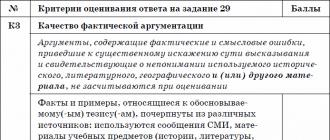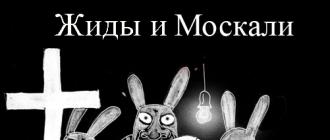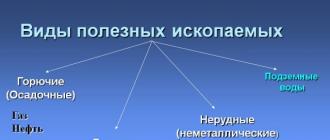Mayakovsky here artistic means. Analysis of Mayakovsky's poem "Nate! What can await the one who opposes himself to society
“Nate!” - the intriguing title of a poem by V. V. Mayakovsky. It was written by the poet in 1913. This work is studied at the lesson of literature in the 11th grade. You are offered a brief analysis of it.
Brief analysis
History of creation- the poem was written in 1913 by young Vladimir Mayakovsky, bold and daring, boldly denouncing the people of his century.
Topic- the struggle of the poet and the crowd, which is unable to understand the high, the decay of society, a sharp decline in the cultural level.
Composition- ring, the poem consists of four stanzas, the first and last end in the same way.
genre- a poem written under the influence of the ideas of futurism.
Poetic size- accent verse, different types of rhyme are used: exact and inexact, male and female, rhyming method - cross ABAB.
Metaphors- “your flabby fat will flow out over a person”, “opened so many verses of caskets”, “look like an oyster from the shells of things”, “perch on a butterfly of a poetic heart”, “hundred-headed louse”.
History of creation
The poem was created by Vladimir Mayakovsky under the impression of the reality surrounding him: in the midst of the First World War, people suffer. live in difficult conditions, but there are also those who skillfully make money on someone else's grief. The young poet despises this crowd, which is incapable of appreciating the “verses of the boxes” that are open to them.
Topic
The idea of confrontation between the poet and the crowd is not new to the history of poetry, many poets embodied it in their poems, but Mayakovsky managed to convey it in a special way, with his characteristic strength and color.
The lyrical hero is brave and not subject to anyone, he is ready to resist the crowd and boldly declares: “if today I ... do not want to grimace in front of you - and now I will laugh and ... I will spit in your face.” He calls himself a "rude Hun", associating himself with a nomad, not limited by boundaries, free.
The meaning of his struggle is understandable - on the one hand, he expresses his contempt, and on the other hand, he tries to attract attention to himself, to find support in the face of people like him.
The poem also raises the theme of the decline in the intellectual level of people. The poet's poems are perceived from a consumer point of view, which worries him a lot.
Composition
The verse consists of four stanzas. The composition of the poem can be called a ring: the poet repeats the same words at the beginning and at the end, saying about himself: “I am a wast and spender of priceless words.”
In the first part, the author regrets that he “opened so many verses of the caskets” to those who cannot appreciate them. The crowd for the poet is a man who has “cabbage somewhere half-eaten, half-eaten cabbage soup” in his mustache, and a woman who has “densely whitened”. But they don't scare him that much.
In the second part, the lyrical hero realizes that these people are dangerous when they are together - "The crowd will become brutal, it will rub, the hundred-headed louse will bristle its legs." Here he seems weak and defenseless, afraid that this rude, dirty crowd will kill the "butterfly of the poet's heart."
But in the third, final part, we again see that fearless hero that was at the beginning, and if he wants, he can laugh and spit in the face of this crowd.
genre
The verse was written under the influence of futuristic ideas, which Mayakovsky was fond of.
It consists of three quatrains and one quintuple. It has the form of an accent verse (approximately the same number of percussive sounds in the lines). Different types of rhyme are used: exact (cabbage soup - things, lane - caskets), inaccurate (cabbage - thick, hearts - rubbed); male (fat - spender), female (hun - spit).
The rhyming method is cross ABAB.
means of expression
The artistic means chosen by Mayakovsky are unusual, bright and sometimes unexpected. He often uses metaphors, for example: “your flabby fat will flow out over a person”, “opened so many verses of caskets”, “look like an oyster from the shells of things”, “perch on a butterfly of a poetic heart”, “hundred-headed louse”.
It is impossible not to notice a few words that are copyright: poetic, hundred-headed louse. This distinguishes Mayakovsky from other poets. His sharp, sometimes rude speech, bold denunciation of the lowest human vices, struggle - are felt in his works, reflect his character.
“Nate!” - the intriguing title of a poem by V. V. Mayakovsky. It was written by the poet in 1913. This work is studied at the lesson of literature in the 11th grade. You are offered a brief analysis of it.
Brief analysis
History of creation- the poem was written in 1913 by young Vladimir Mayakovsky, bold and daring, boldly denouncing the people of his century.
Topic- the struggle of the poet and the crowd, which is unable to understand the high, the decay of society, a sharp decline in the cultural level.
Composition- ring, the poem consists of four stanzas, the first and last end in the same way.
genre- a poem written under the influence of the ideas of futurism.
Poetic size- accent verse, different types of rhyme are used: exact and inexact, male and female, rhyming method - cross ABAB.
Metaphors- “your flabby fat will flow out over a person”, “opened so many verses of caskets”, “look like an oyster from the shells of things”, “perch on a butterfly of a poetic heart”, “hundred-headed louse”.
History of creation
The poem was created by Vladimir Mayakovsky under the impression of the reality surrounding him: in the midst of the First World War, people suffer. live in difficult conditions, but there are also those who skillfully make money on someone else's grief. The young poet despises this crowd, which is incapable of appreciating the "verses of the boxes" open to them.
Topic
The idea of confrontation between the poet and the crowd is not new to the history of poetry, many poets embodied it in their poems, but Mayakovsky managed to convey it in a special way, with his characteristic strength and color.
The lyrical hero is bold and not subject to anyone, he is ready to resist the crowd and boldly declares: “if today I ... do not want to grimace in front of you - and now I will laugh and ... spit in your face”. He calls himself a "rude Hun", associating himself with a nomad, not limited by boundaries, free.
The meaning of his struggle is understandable - on the one hand, he expresses his contempt, and on the other hand, he tries to attract attention to himself, to find support in the face of people like him.
The poem also raises the theme of the decline in the intellectual level of people. The poet's poems are perceived from a consumer point of view, which worries him a lot.
Composition
The verse consists of four stanzas. The composition of the poem can be called a ring: the poet repeats the same words at the beginning and at the end, saying about himself: “I am a wast and spender of priceless words”.
In the first part, the author regrets that he “opened so many verses of the caskets” to those who cannot appreciate them. The crowd for the poet is a man who "has cabbage somewhere half-eaten, half-eaten cabbage soup" in his mustache, and a woman who has "densely whitened". But they don't scare him that much.
In the second part, the lyrical hero realizes that these people are dangerous when they are together - “The crowd will become brutal, it will rub, the hundred-headed louse will bristle its legs.” Here he seems weak and defenseless, afraid that this rude, dirty crowd will kill the "butterfly of the poet's heart."
But in the third, final part, we again see that fearless hero that was at the beginning, and if he wants, he can laugh and spit in the face of this crowd.
genre
The verse was written under the influence of futuristic ideas, which Mayakovsky was fond of.
It consists of three quatrains and one quintuple. It has the form of an accent verse (approximately the same number of percussive sounds in the lines). Different types of rhyme are used: exact (cabbage soup - things, lane - caskets), inaccurate (cabbage - thick, hearts - rubbed); male (fat - spender), female (hun - spit).
The rhyming method is cross ABAB.
means of expression
The artistic means chosen by Mayakovsky are unusual, bright and sometimes unexpected. He often uses metaphors, for example: “your flabby fat will flow out over a person”, “opened so many verses of caskets”, “look like an oyster from the shells of things”, “perch on a butterfly of a poetic heart”, “hundred-headed louse”.
It is impossible not to notice a few words that are copyright: poetic, hundred-headed louse. This distinguishes Mayakovsky from other poets. His sharp, sometimes rude speech, bold denunciation of the lowest human vices, struggle - are felt in his works, reflect his character.
Poem Test
Analysis Rating
Average rating: 3.8. Total ratings received: 46.
Mayakovsky in the poem "Nate" clutters up the mind. The multitude of objects, the monstrous shapelessness of the details, the avalanche of the grotesque hypnotize; perhaps that is why it is often difficult to object to Mayakovsky. To some extent, here he can be compared with Boris Pasternak, because. Pasternak, inventing his own coordinate system, which can be conditionally called “jamais vu” (that is, the priority of the explicit over the metaphysical), also piles up objects. However, reading both poets, one can be convinced that the details of Pasternak, in contrast to the details of Mayakovsky, firstly, exist only in the present, without falling into the past and not looking ahead into the future, like Mayakovsky, whose details suffer from paramnesia , whose characteristic symptom is dejă vu, i.e. mixture of explicit and metaphysical. Secondly, Pasternak proceeds from considerations of taste when he attracts some detail from the outside, while Mayakovsky does not seem to think about whether the detail is “tasty” or not, which gives a “slap in the face to public taste”. For example, let's compare:
…heart, splashing on the playgrounds,
wagon pours doors in the steppe...
(Parsnip)
... All of you on a poetic butterfly hearts
perch, dirty, in galoshes and without galoshes…
(Mayakovsky)
Such differences between Pasternak and Mayakovsky, to some extent, can be explained (conditionally, not deliberately) by their belonging to different currents: for example, Mayakovsky is a futurist, and Pasternak is an acmeist. One of the "commandments" of acmeism, declared in the manifesto of O.E. Mandelstam, “Love the existence of a thing more than the thing itself.” Mayakovsky does not seem to follow this commandment. He loves the thing itself. “The futurist, not realizing the true meaning of the word, throws it away,” is Mayakovsky’s commandment, written by Mandelstam. But the words “easily thrown out” carry a certain semantic load, due to the exchange of meanings with other words through alliteration and shifting of accents, which, by the way, Mayakovsky often does. Thanks to purely "technical" techniques - alliterated sounds (for example, " With mo tr ite y page itzei") - details are involved in the poem, and they "keep" in the verses solely because of them (devices). And since they "hold on", they are forced to accept the meaning of the whole poem; so, if the poem is satirical, then the task of conveying the satirical meaning is assigned to the detail. Let's try to show this on the example of Mayakovsky's poem. Take the poem "Nate!" and consider it, revealing how its satirical meaning is revealed in the context of details.
I’ll make a reservation right away that it’s no coincidence that the above was about the “clutter of consciousness” characteristic of Mayakovsky. The fact that Mayakovsky uses it everywhere as an artistic principle can be motivated by the fact that “Nate!” - a satirical poem. Attracting the "butterfly", "heart", i.e. rather fragile objects, Mayakovsky, not caring about compatibility, specially draws "perched", "dirty", "in galoshes and without galoshes". The philosopher remarked: “Satire is the transition of the significant into nothing”; in the same way, Mayakovsky makes the transition of the fragile (“the butterfly of the poetic heart”) into nothingness, into galoshes.” However, let's not get ahead of ourselves.
"In an hour from here to a clean alley / Your flabby fat will flow out over a person." Obviously, an hour is a conditional period of time, given that time in Mayakovsky's poetry is a conditional concept, because it depends on the "time of details"; e.g. "cabbage half-eaten cabbage soup" - a detail of the past, and "hundred-headed louse" - of the future ("a crowd of brutal no"). Here, most likely, a satirical comparison of the hour of people with "flabby fat" (bourgeoisie, probably) and the eternity of priceless words and their spender (the poet). Let us pay attention to the impartiality of the “flabby fat”, which from somewhere, where the “verses of the casket” are opened, follows “according to the person”, and to the “coziness” of the caskets and the image of the spendthrift. The first stanza is built on such a deliberate contrast, and even at the level of sound writing, this satirical conflict can be traced. The first two verses are built on alliterated hissing: "h": " h herez" - " h as" - "in h true "-" you h et" - "according to h man"; "w" / "g": "wa w"-" flabby w ii" - " well ir". The last two verses of the first stanza are in more voiced: “to”: “from To ryt" - "sh To atulo To»; "m", "t":
…I am v a m O opened st O only verse O in school a tul O To…
The contrast between the first and second halves of the first stanza is also due to the “commonality” of the first two verses and the last two. Thus, even at the semantic level, Mayakovsky has a satirical conflict; details like "flabby fat" and "clear alleyway" take on additional meaning. For example, an alley with voiced “r” and “k” does not have hissing and, as it were, does not belong to “flabby fat”, but “clean” -
with an alliterated "h" - loses (in a futuristic way) its meaning of pure purity.
We read further the poem "Nate" It is obvious that Mayakovsky "according to the person" attracts first a man, then a woman to the present poetry. Moreover, they really exist in the present, since he, as it were, addresses them: “ Here you…” However, Mayakovsky’s penchant for “paramnesia” (dejă vu) makes itself felt, and he draws on details from the past using the grotesque: “Cabbage<…>somewhere half-finished, half-eaten cabbage soup”; then he shifts the emphasis from the present ("woman") to the usual - ("things, sink”), which increases the effect of satire; those. his present is not ordinary, petty-bourgeois, philistine, but something else.
Then he turns the fragile into nothing, and what can be considered negative (apparently philistine), which, in fact, the satire is aimed at - all with alliterated hissing: “kalo w and about SCH etinite but well cystic head in w b".
“... To me, a rude Hun,” Mayakovsky, finally, definitively indicates his difference from the supposedly “refined connoisseurs of art”; it seems that they do not notice its grotesque, its details at all. And he, apparently, decides on a desperate one - to prove the strength and independence of his priceless words and details - "I will laugh and spit joyfully." The inversion “I’ll spit in your face // I…” adds additional turmoil to the general cheerful and at the same time terrifying chaos, and here satire is in terrifying, demonic fun, laughter over people with “flabby fat”.
Mayakovsky's satire is powerful, destructive, since cluttering up the mind with "metal structures" from the words "general meaning" is a dangerous and effective technique; the rhythm of Mayakovsky's verses also unites the details - the verses receive additional power thanks to the iambic almost without pyrrhias. There is a feeling of an incredible Alter Ego, which puts too much pressure on the often just Ego of an average person. Often Mayakovsky's poems look like a medieval painting by Bosch, where some hundred-legged, hundred-headed creature is tossing and turning in every corner, trying to attract attention. In Mayakovsky, the details are kept almost the same as in the picture, on an invisible canvas.
The most terrible and destructive in Mayakovsky’s satire is the transformation of all chaos, the uncertainty of time, space (“somewhere”, “from here”, “here you are ...” - “half-eaten, half-eaten”), the incompatibility of the present and the ordinary into a spendthrift and waste. Unfortunately, I am more inclined to believe that the existence of a thing should be loved more than the thing itself, just as the meaning of a word is more than the word itself. “Walking in the forest of symbols” and “picking up” a difficult word with a knitting needle were indicated by Mandelstam in “Morning of Acmeism” as untenable methods of poetry. Although Mayakovsky's poems suffer from dejă vu, his satire and poetry in general are amazingly done, with a clutter of consciousness and with this very dejă vu, a swing from the past to the future in the context of the present and vice versa.
An hour from here to a clean lane
your flabby fat will flow out over a person,
and I opened so many verses of caskets for you,
I am a wast and a spender of priceless words.
Here you are, man, you have cabbage in your mustache
Somewhere half-finished, half-eaten cabbage soup;
here you are, a woman, whitened thickly on you,
you look like an oyster from the shells of things.
All of you on the butterfly of a poetic heart
pile up, dirty, in galoshes and without galoshes.
The crowd will go wild, will rub,
bristle legs hundred-headed louse.
And if today I, a rude Hun,
I don’t want to grimace in front of you - and here
I will laugh and spit joyfully,
spit in your face
I am a priceless spender and spender.
Analysis of the poem "Nate!" Mayakovsky
The appearance of Mayakovsky in the Russian poetic society can be compared with the effect of an exploding bomb. At the beginning of the 20th century, many poets used non-standard images and techniques in their work. But it was Mayakovsky who acquired the most scandalous fame. In 1913, he wrote the poem "Nate!", Which became his program statement to the public.
At this time, the public performance of poets was very popular. This provided a way to earn money and gain fame for those who did not have the opportunity to publish their works. The speeches of novice authors sometimes took on the character of a humiliated request for handouts from a bored society. For wealthy listeners, this developed false conceit, they began to consider themselves true connoisseurs and connoisseurs of art.
Mayakovsky's contempt for bourgeois society is well known. It was further intensified due to the forced participation of the poet in such public readings. The poem "Nate!" became a sharp protest of the author, directed against those who perceived his work as just another entertainment. One can imagine the reaction of a person who first came to Mayakovsky's performance with this poem.
The aggressive style and content of the work should immediately cause a negative reaction in the listener. Mayakovsky declares that his poetic gift is wasted in front of "flabby fat". The author snatches from the crowd the characteristic male and female images, personifying all the abominations of society. The man has “cabbage in his mustache”, and the woman is not even visible because of the cosmetics and the abundance of items belonging to her. Nevertheless, these "subhumans" are respected and revered members of the human society.
The main way in which Mayakovsky describes the crowd is "a hundred-headed louse." Thanks to money, the human mass claims its rights to the personality of the poet. She believes that, having bought his time, she has the power to dispose of the talent at her discretion.
Mayakovsky goes against the rules of a decent society. He, like the "rough Hun", commits an individual rebellion. Instead of a decent admiration and antics of the poet, a spit flies in the face of the crowd. All the hatred accumulated by the author is concentrated in this spit.
The poem "Nate!" - one of the most powerful works of protest in Russian poetry. No one before Mayakovsky expressed such open contempt for his own listeners. In it one can see the germ of modern ultra-radical art.
Note: this verse is also called “Hate!”, which means “hatred” in English.
The poem "Nate!" was written in 1913. In this work, the lyrical hero is completely alone. He is forced to be surrounded by "fat" inhabitants who do not care about poetry. This is one of the most sarcastic works of the poet.
The first stanza: the opposition of people and the lyrical hero
Analysis of the poem "Nate!" Mayakovsky shows that one of the main artistic techniques used by Mayakovsky in his work “Nate!” is the antithesis. Even the catchy title of the poem speaks volumes about its character. The lyrical hero in Mayakovsky's early work almost always opposes himself to the world around him. He tries to look at reality from the outside, and all that this look causes in him is horror. The lyrical hero is a romantic, and the flabby world is opposed to him. This is emphasized by the use of the pronouns "I" - "we", which are quite contrastingly contrasted in the structure of the work.

Features of the second stanza: unusual comparisons
Conducting a further analysis of the poem "Nate!" Mayakovsky, the student can talk about the content of the next stanza. It differs in that it describes not only the deafness of listeners to what the poet said. People are starting to change their appearance. For example, a man becomes like a pig because of his sloppy behavior, a woman looks like an oyster. Here you can see that behind these words, which at first glance seem like ordinary insults, is the poet's desire to point out the limitations of ordinary people. After all, the oyster always sits in its shell, and it cannot see what is happening outside its little world.
White, with which the heroine's face is densely covered, evokes associations with a doll. The woman does not hear what the lyrical hero is talking about. She looks like a doll with a beautiful appearance and a completely empty inner world.

Third stanza: confrontation between people and a lyrical hero
Further analysis of the poem "Nate!" Mayakovsky shows that here this opposition reaches its climax. The incorrect form used by Mayakovsky in the expression "the butterfly of the poet's heart" is intended to emphasize the vulnerability of poetry to the judgment of the crowd. Ozverev, she threatens to trample on the lyrical hero. In order to describe the crowd, Mayakovsky uses the epithet "dirty". The very image of a crowd of people is created by the poet with the help of just one detail - galoshes. With the help of this characteristic, the poet creates a rather mundane image.

Antithesis in the work
The city itself also opposes the lyrical hero, which is emphasized with the help of antonyms “clean” - “dirty”. This fact can also be indicated by analyzing the poem "Nate!" Mayakovsky. The alley is beautiful in the morning because it is clean. But gradually passers-by crawl out of their houses and begin to dirty it. Mayakovsky writes: “Your flabby fat will flow out over a person.” In this place, the poet uses the shocking method. This can also be indicated by conducting a brief analysis of the poem "Nate!" Mayakovsky according to plan. He wants to anger his reader, to shock him. At the same time, the poet wants to make you think about real values that cannot be replaced by external beauty.
Mayakovsky is annoyed by well-fed and self-satisfied people who are dressed up and painted. Indeed, under this decent appearance, as if behind a mask, vile and evil souls are hidden. Their internal state, unfortunately, cannot be replaced by appearance.
Every resident of the city lives, goes his own way. He does not care what the lyrical hero of the work thinks and feels. He gets overlooked by other people. Perhaps that is why the lyrical hero of Mayakovsky would like to hurt the inhabitants of the city as painfully as possible.

Fourth stanza: conflict resolution
Conducting a brief analysis of the poem "Nate!" V. V. Mayakovsky, the student can indicate: in this part there are five lines, and not four, as in the previous ones. The poet writes that if he wants, he will “spit in the face” of the crowd. And perhaps this is the only way to resolve the conflict between the poet and the crowd. The lyrical hero feels completely misunderstood and lonely.
In his work, Mayakovsky speaks of those values that belong to the highest order. This is the spiritual side of human life, happiness and sorrow. First of all, poetry is called upon to bring these values to life. Almost the entire arsenal of sublime artistic means turns out to be dedicated specifically to her (“verses of caskets”, “butterfly of a poetic heart”).
Analysis of the poem "Nate!" V. V. Mayakovsky: the poet and the crowd
Often, critics believed that Mayakovsky's early work was too selfish. But it is precisely the moment that Vladimir Vladimirovich opposed to society not himself as a single individual, but the type of poetic personality - any human being who is philosophically gifted. At the beginning of his work, the poet peers into the faces of passers-by, but then they all merge into one. When Mayakovsky speaks of a "going wild" crowd and a "hundred-headed louse," the reader may feel a reference to a particular literary tradition.
What can await the one who opposes himself to society
Analysis of the poem "Nate!" Vladimir Mayakovsky is one of the best examples of the poet's sarcastic creativity. However, such irony does not always lead to good things. A thoughtful reader may involuntarily recall the main character of the work "Crime and Punishment" by F. M. Dostoevsky, Raskolnikov. He divided all mankind into two types: “trembling creatures” and more worthy ones - “having the right”. For those who belong to the first category, life is destined for a miserable existence in the midst of everyday problems, endless fuss. And for others, the sea is knee-deep - for them there are absolutely no laws. And the reader from the work of Dostoevsky knows what such tendencies can lead to. But the position of "master of life" for many is too tempting.
In this respect, the poet becomes like Raskolnikov. He despises people as a miserable crowd; they appear to him malicious and utterly insignificant. On the other hand, the poet turns out to be very vulnerable - after all, his heart is comparable to a butterfly. In many works of Mayakovsky, the lyrical hero has the courage to challenge the crowd. However, in this poem he is seized by a feeling of a different kind - and it is rather horror.





